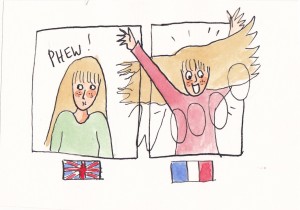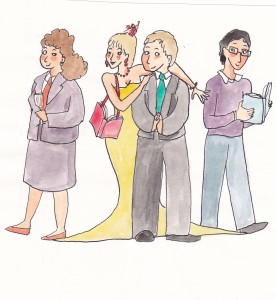I spend half of my life complaining about how difficult it is to write children’s books for the French market, and the other half complaining about how difficult it is to write children’s books for the UK market. The happy corollary to this is that I spend half of my life praising the French market, and the other half praising the UK market.
Several people have asked me to write about the differences between UK and French children’s publishing, and what it means for writers (they might have asked me this so I get it out of my system, bored as they are of hearing me going on and on about it). It’s true that the two systems are extremely different, and for someone who attempts to write children’s books for each market, and to have a writing career in both countries, it’s a bit of a schizophrenic exercise.
‘Literariness’ versus ‘wide appeal’
Writing in English for the UK market means, to me, a certain compromise between ‘literariness’ and ‘commercialness’. This isn’t to say that French publishers don’t care about sales – of course they do – but I have never been asked by a French publisher to make a book or book proposal more commercial. However, in the UK market, wide appeal is absolutely crucial.
This is in part because writing for the UK market means writing, potentially, for all the anglophone markets – and, hopefully, for many others. We are asked to consider not just if British kids will like the books, but also if American, Australian, South African, and also German, Spanish, Turkish, Korean and Thai kids will like them too. Foreign right sales are hugely important and it is expected that a book should be sold abroad.
In France, for most publishers, foreign right sales are a lovely bonus for a children’s writer, but they’re something to celebrate, not something you really expect.
Money matters
As a result, what you can expect to earn is radically different. People don’t always believe me, but the difference between a French advance and a UK advance, for a children’s writer like me, is quite literally 1 to 10. Being a full-time children’s writer in France means writing sometimes dozens of books a year and doing scores of events. Being a full-time children’s writer in the UK, in terms of income, is much, much more comfortable (though by no means ideal, I hasten to say).
Other things differ drastically. In the UK, after your first book, you generally get an advance before you’ve written the whole book. None of that in France, where you damn well write the damn whole book before pitching it to your publishers, and they might very well be like ummm… no. Sorry about the year of your life you spent writing it.
‘Faithfulness’ to publishers
Writing dozens of books a year requires having different publishers, and France is much more tolerant of this practice than Britain. Here in the UK, having more than one publisher isn’t ideal; in France, few children’s writers (at my level) have the luxury of being ‘faithful’ to one house. Of course, we’ve got a reputation for that kind of thing in matters of love too, so maybe that’s not surprising…
Agents
Agents are a huge difference between the UK and France. In France, literary agents basically don’t exist; sporadically, you’ll hear that ‘they’re coming now!’ but actually… they aren’t. Writers have to struggle against editors all the time to negotiate contracts, get advances, get paid. It’s a bit of a nightmare, and something I’d much rather avoid.
In the UK, the possibility of having an agent is an absolute blessing – though I fully understand that many authors prefer to fend for themselves, I relish the presence of an intermediary between me and the publishing houses.
Political content of children’s books
Another, tricky difference: ‘radical’ children’s literature and controversial nature of the books’ content. UK people don’t always believe me, but genuinely – French children’s literature is much more radical. Much more racy, much more politically incorrect, much more politically committed, much more uncomfortable.
My French books, for most of them, are unpublishable in the UK, especially my YA books, because they would have to be readjusted for adults. Similarly, younger books can have darker and scarier content. Ambiguity, especially in endings, is accepted much more easily in France.
This is not due to the fact that editors are squeamish in the UK, but rather that they are worried that the book might be boycotted, banned, blacklisted by prescriptors. There’s a constant desire to appeal to the greatest number – and to avoid at all costs upsetting the adult mediators – and this means controlling the ideological content of the books much more.
Branding and promotion
In the UK, author ‘branding’ is hugely important – and it also means that it’s less easy to move between age ranges or genres. In France, I can publish a funny picturebook one month and a YA novel about revenge porn the next. But each book will reach such different audiences, and so randomly, that I’m unlikely to be recognised in either of the two markets.
Obviously, France is a much smaller pond, too: it’s relatively easy to become well-known, at least by name, and especially now that blogs and Facebook (much more than Twitter) are so popular among writers and illustrators. Being a debut UK author means streaming through a torrent of tweets from anglophone writers around the world, and it’s quite a daunting experience.
On the other hand, being a debut author in the UK or US is celebrated – you get a press release, a launch, some attention, and a lot of help from publishers to find events. In France? it’s nothing special. You have a book out. Youpi.
In short…
Neither situation is, of course, entirely ideal, but neither situation is entirely bad either. I love the fact that, in France (and with my main publisher Sarbacane) I can write about pretty much whatever I want. In the UK, I love the fact that my books are more widely read, and that there is so much work done by the publisher to promote them and sell them abroad. I also enjoy the additional money – sure; but it comes at a cost, too: that of compromising on ‘literariness’ or on ‘what I want to write’.
This is why I’m keeping up (or trying to keep up) writing on both sides of the Channel, and so far it’s brought me many more pleasures than disappointments.




